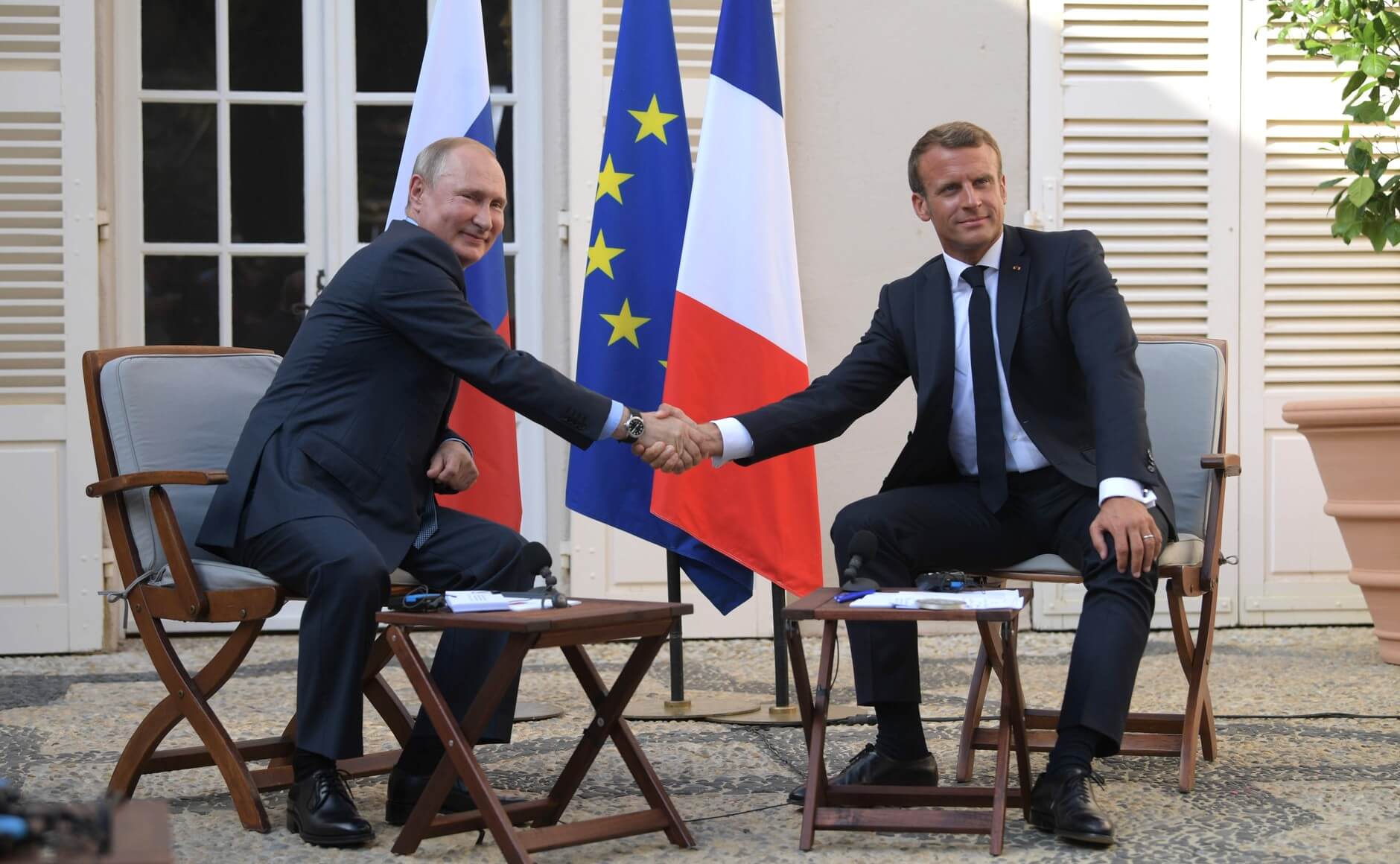NATO continues interfering in the affairs of other countries, causing much pain and suffering across the world. It is time to tether it or dissolve it for good.

Ukraine is the largest country in Europe after Russia. Surrounded by Belarus, Hungary, Moldova, Poland, Romania, Slovakia, the Sea of Azov, and the Black Sea, it shares the longest border with Russia.
According to the Peace Worldwide Organization’s Civility Report 2022, Ukraine has a population of about 44 million. It has a reputation for being racist and widely corrupt. It faces internal armed conflict for suppressing the people of Donbas (Donetsk and Luhansk regions), a fact that has resulted in many civilian injuries, deaths, and displacements. Torture and other forms of human rights abuses are widely used. Human rights defenders and independent journalists risk being attacked. Harassment and suppression of non-Slavic ethnic minorities, especially the Roma, Tartars, Jews, and political asylum seekers continue. Violence against women and girls remains widespread.
Ukraine has a short history relative to its powerful neighbor Russia. Although people lived there for centuries, as Ali Rogin, a foreign affairs producer at the PBS Newshour, explains, the region was often ruled by Austria-Hungary, Lithuania, Poland, or Russia. The end of World War I inspired an independence movement that led to the birth of the Ukrainian Socialist Soviet Republic in 1922. Ukrainians nevertheless remained divided. Some favored Nazi occupation before World War II.
The territory we now know as Ukraine was finalized when the Soviet leader Nikita Khrushchev took Crimea away from Russia and gave it to Ukraine. In 1991 when the Soviet Union fell, Ukraine declared independence. In 2004, Ukrainians elected Vikto Yanukovych, a pro-Russian prime-minister, to lead the country, though the election failed to meet international standards.
A Free Election, Status of Russian and Crimea
In 2010 in a fair and free election in Ukraine, Viktor Yanukovych was elected president of Ukraine. The new president favored better relations with neighboring Russia. In 2013, a pro-European Union uprising broke out in Ukraine. Ukrainian security forces over-reacted, shooting and killing numerous people, which led to much wider protests against Yanukovych. Instead of an official impeachment, the Verkhovna Rada Committee, composed of experts advising the Ukrainian parliament, declared that Mr. Yanukovych should be removed from office on February 22, 2014. The large Russian ethnic minority in Ukraine rejected that declaration and generally remained loyal to Mr. Yanukovych.
On February 23, the Ukrainian parliament passed a bill that repealed Russian language as an official status. That further angered the pro-Russians in Ukraine. Their protests intensified causing a rebellion to emerge against the Ukrainian forces. Russians formed about 90 cent of Crimea’s population and overwhelmingly voted in a referendum to leave Ukraine and become a part of Russia. Days later, In March 2014, the Russo-Ukrainian War began with Russia lending its support to pro-Russian separatist forces in Crimea.
Russia invaded and annexed Crimea, a territory that Russia had previously received from the Ottomans in the 1774 Treaty of Kucuk Kaynarca, at a time when it was fully inhabited by ethnic Tatars. Crimea remained a part of Russia for 180 years until 1954 when Soviet leader Nikita Khrushchev assigned it to Ukraine. Prior to 1954, Crimea had been inhabited by Russians and persecuted Tatars.
It was only on May 25 of that year that President Yanukovych was officially impeached and removed from office by the Ukrainian Parliament.
A History of Cold War and More
Russia and Ukraine have deep cultural, economic, familial, and political ties, going back for centuries. Millions of Russians live in Ukraine and have family ties with other Ukrainians. Furthermore, Russia and Ukraine were the two original members of the Union of Soviet Socialist Republics that was formed in 1922, eventually consisting of 15 republics, including Russia and Ukraine.
The US, the Soviet Union, and a number of other countries allied to defeat the Nazi Germany in the Second World War that was followed by the Cold War, a political rivalry began between the US and the Soviet Union. They emerged as the world’s two superpowers, competing for political influence and access to resources. They waged proxy wars throughout the world, producing many bloody conflicts across the globe.
In 1949, the US led the move to create the North Atlantic Treaty Organization (NATO), specifically designed to resist Soviet aggression. Paradoxically, the US-led NATO has been amongst the first to violate its commitments to the UN, leading to its perception by some as the world’s leading troublemaker since its inception. According to the previously cited Civility Report 2022, NATO has continued “stockpiling as offensive; conventional, biological, radiological, chemical, and nuclear weaponry as well as arming other nations or groups, having a military presence in other nations, giving military aid to belligerent nations, participating in military alliances,” actions that “would increase tension worldwide and violate the commitments to the UN for working towards peace and security.” NATO countries are responsible for over 75% of global arms exports. Among the recipients are some of the world’s most repressive regimes, such as “Egypt, Israel, Kuwait, Pakistan, Qatar, Saudi Arabia, and UAE.”
In 1955, the Soviet Union led the formation of the Warsaw Treaty Organization (WTO), also known as the Warsaw Pact, as a balance of power to NATO to resist NATO’s aggression. The Korean War and the Vietnam War are just two examples where the two fought proxy wars, wasting millions of lives.
In 1990, after the fall of the Berlin wall in 1989, the US and Russia agreed that NATO would not expand beyond East Germany after its reunion with Germany. This was confirmed by NATO’s secretary. That set the stage for the unification of East Germany and West Germany later that year.
In 1991, the Soviet Union and the Warsaw Pact fell. However, NATO did not dissolve, but continued. Despite the assurances from the US and the NATO’s Secretary that NATO would not go beyond the former East Germany into the former republics of the Soviet Union, they did not live up to their promises. On the initiative of the US, NATO moved eastward, taking in former Soviet republics. In 1994 as a response to NATO, Russia persuaded Armenia, Belarus, Kazakhstan, Kyrgyzstan, and Tajikistan to sign a defense treaty – the Collective Security Treaty Organization (CSTO), similar to the NATO – stipulating that aggression against any signatory is to be seen as aggression against all.
Russian Invasion a Reaction to NATO Expansion
After the fall of the Soviet Union in 1991, Russia has persistently expressed its disapproval of NATO expansion into the former Soviet states. The last official warning to NATO was given in December 2021. The US has consistently ignored those warnings, including the latest one. In its 2021 draft agreements with NATO, Russia demanded, among other things, that NATO bar any military activity in Ukraine. NATO ignored the warnings.
To stop the NATO aggression, Russia deemed itself forced to invade Ukraine. The invasion kicked off on February 24, 2022. The 2022 Russian invasion of Ukraine could be seen as an escalation of the 2014 Russo-Ukrainian War.
For Americans to understand why Russia believes that Ukraine must not be a member of NATO they might see a parallel with the 1962 Cuban Missile Crisis when the Soviets installed some of their offensive nuclear missiles in Cuba. If the Soviets had not withdrawn those missiles, it could have resulted in another world war. If Ukraine joins NATO, Russia could have the US offensive nuclear missiles at its borders.
It has now become apparent that most nations representing a majority of the world’s population do not support the US-led NATO’s action against Russia and reject the US effort to isolate Russia.
The US political leaders should learn lessons from their past mistakes. Sanctions are counterproductive. The US has imposed particularly hard sanctions on Iran with no effect on the Iranian government’s behavior. Rather, Iran turned to developing its own military capabilities and becoming a far stronger adversary to the US hegemony in the region. US sanctions have caused price increases on many goods and services across the world, resulting in more poverty and destruction worldwide. If US sanctions against Russia, Iran, Venezuela, and other countries continue, it may have the effect of leading the world into a deep recession, where the American people themselves would be among the victims..
Negotiating Peace Is the Right Thing to Do
“We seek peace, knowing that peace is the climate of freedom,” said Dwight D. Eisenhower, 34th President of the United States. Instead of pouring fuel on fire by arming Ukraine in the war, the US should take the lead negotiating with Russia. If the war continues, both the US and Russia will lose.
Just as in the Cuban Missile Crisis, negotiation is the only path for resolving the issues. Escalation may ultimately lead to a nuclear war, threatening the existence not only of the US and Russia, but the entire world.
Most of the world’s population is sympathetic to Russian security concerns and fears NATO’s aggression. Regional powers like China, India, and Iran would like to see a ceasefire and negotiations to address the Russian issues. Former U.S. secretary of state Henry A. Kissinger, who has blood on his hands for the US interventions in other countries, has come to the realization that NATO’s aggressive stance is counterproductive. Kissinger has urged NATO to negotiate and give up territory to Russia to stop the war.
It is now time for the US to act. On behalf of NATO, the US should negotiate directly with Russia, addressing its security concerns. The US must be willing to let Ukraine remain a neutral country. If that does not mitigate the Russian security concerns, the US may have to consider letting Estonia’s, Latvia’s and Lithuania’s membership be withdrawn from NATO to become neutral countries as well. Once the negotiation is completed, the UN Security Council would have to guarantee the neutrality of those countries.
Yet, far better would be an initiative of the US to prepare the dissolution of NATO, an organization that has brought about so much pain and suffering across the world. This would be the first step in working towards a world free from armaments.
As for Russia, it should make reparations for the loss of lives, injuries, human displacement, and property destruction inflicted on Tatars and Native Crimeans, since taking over from the Ottomans in 1774.
The path to peace can only be achieved by everyone coming to the negotiating table, giving up something they want and atoning for past wrongs. With 250 million people on the verge of starvation, that time has come.
By Mehdi Alavi
This article was originally published on Fair Observer on July 9, 2022.













